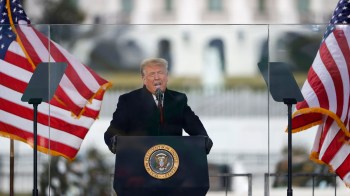Jamie Dimon’s testimony was a wake for Dodd-Frank
Kai Ryssdal: It was a packed Senate hearing room into which Jamie Dimon stepped this morning shortly before 10 Washington time. He was invited to explain how his bank managed to lose $2 billion — or possibly more by the time it’s all over — without him knowing anything about it.
There were mea culpas and apologies, promises not to let it happen again and mostly gentle questioning from the members of the committee. Our New York bureau chief Heidi Moore made the trip down to Washington for the hearing. Hey Heidi.
Heidi Moore: Hey Kai.
Ryssdal: So set the scene for us — what was the vibe? What was the lay of the land in there?
Moore: Sure. It was an enormous room. Some people had called it “Dimonpalooza,” and it was like that. It had this circus-like atmosphere. The room held 300 people, and really the only empty seats, interestingly, were at the front of the room. Clearly, some members of the committee felt like they had better things to do than grill Jamie Dimon, who as you know, has been the favorite son of Washington as far as Wall Street goes.
Ryssdal: Yeah, it was very much Washington’s favorite banker coming to town to see them, right?
Moore: Yes. The glow, the aura of Jamie Dimon definitely followed him down here, and the questioning reflected that. They went very, very easy on him.
Ryssdal: Right. Getting to the substance of what was said, Mr. Dimon said a couple of times when he was asked, ‘Risk is part of what we do. It is the essence of being a banker.’ Did that carry any weight with the committee? Did they need convincing?
Moore: I don’t think they needed convincing. If anything, they were all on the same page. And to a certain extent, he’s right. If you’re a banker, you have to lend, you never know who you’re lending to. Risk is part of the job — to a certain extent. The question we’re all trying to answer is: What is that extent? What is the upper limit? Because when you and I talk about risk, we hear the word ‘risk.’ But increasingly, when you talk to Wall Street bankers about risk, they hear the word ‘reward.’ And they need a lot of rewards, they need a lot of profits to make up for, you know, what happened in 2008.
Ryssdal: Right. And getting to that and the aftermath, this idea that maybe things don’t bode well for Dodd-Frank. Of course Jamie Dimon is going to say when asked, ‘You know, I don’t know if new regulations have actually done anything good.’ But he also said this today, when asked about rules and regulations. Here we go, play it.
Jamie Dimon: A lot of the things that caused the problem don’t exist anymore, and that wasn’t because of regulations. That was because of markets.
We are now four-something years after the financial crisis, Dodd-Frank is a couple years old — we’re still waiting on it to be fully implemented. Is it doing any good?
Moore: Well, let’s just examine Jamie Dimon’s statement there for your answer. So he said a lot of those things don’t exist anymore. One of the things he mentioned was subprime mortgages. I’m sure it will be news to Bank of America and Citigroup and Fannie Mae that subprime mortgages are no longer a problem, because they’re still cleaning up those issues from four years ago. And so the question is: What have we done with that impetus? The time may have passed to use that anger to create the kind of change in the financial system that we needed to create. Dodd-Frank, this was a wake for Dodd-Frank. This wasn’t just testimony. They’re all gathered in this big room with lots of marble to basically just say prayers over the end of any real impetus to change the financial system.
Ryssdal: Jamie Dimon goes to the House next week. Will that hearing be any feistier?
Moore: The House hearings usually are, just because they’re a little bit more chaotic, and the House tends to be closer to the people. But again, you have the Jamie Dimon aura, and you have the same issue, which is no one wants to confront the embarrassment of financial reform that has not come to fruition. And I doubt that the House is much different on that front.
Ryssdal: Interesting factoid that I saw online just before I walked into the studio: There was a picture of Jamie Dimon standing there before his testimony, wearing White House presidential cufflinks. Chutzpah, baby. All right, Heidi Moore in Washington for us today. We’ll see you later.
Moore: See you later, thanks.
There’s a lot happening in the world. Through it all, Marketplace is here for you.
You rely on Marketplace to break down the world’s events and tell you how it affects you in a fact-based, approachable way. We rely on your financial support to keep making that possible.
Your donation today powers the independent journalism that you rely on. For just $5/month, you can help sustain Marketplace so we can keep reporting on the things that matter to you.


















